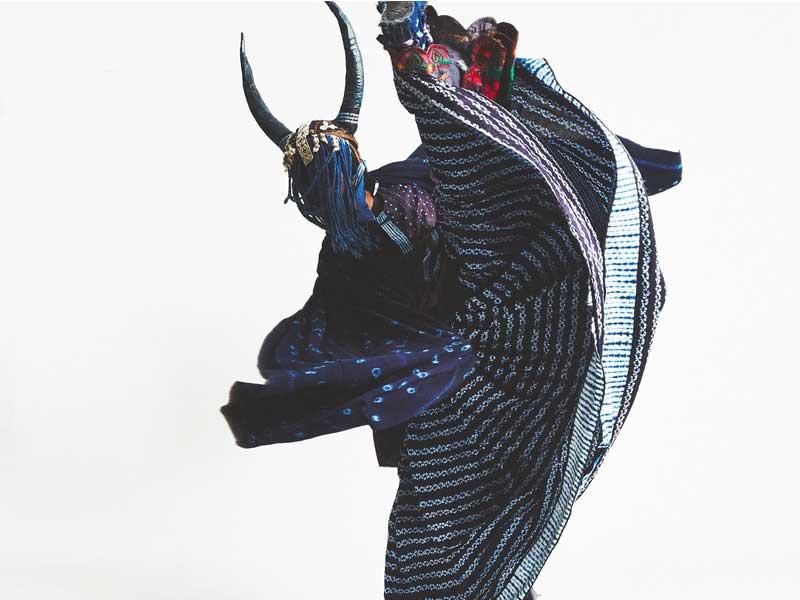Newcomb Art Museum announces new exhibition ‘Laura Anderson Barbata: Transcommunality’
Newcomb Art Museum of Tulane University announces its upcoming exhibition, Laura Anderson Barbata: Transcommunality. Starting Jan. 19, Tulane students, staff and faculty can visit the museum Wednesday and Friday mornings between 9 a.m. and 12 p.m. to explore the show in person. On view through Oct. 2, 2021, the exhibition is currently accessible to off-campus visitors through the museum’s website and its exciting line up of virtual programs – including an opening celebration livestream artist talk and curator tour on Saturday, Jan. 16 at 3 p.m. available to all via Zoom here.
Transcommunality focuses on five collaborations that Anderson Barbata has made across the Americas – from the Amazon of Venezuela, to Trinidad and Tobago, Mexico, and New York – and presents them together for the first time. Though varying in process, tradition and message, each of these collaborative projects emphasizes Anderson Barbata’s understanding of art as a system of shared practical actions with the capacity to increase communication and connection. Centered on issues of cultural diversity and sustainability, this work blends political activism, street theater, sculpture, and arts education and brings attention to issues of civil, indigenous and environmental rights.
The events of this past year – from uprisings across the country in response to fatal police shootings, to the disproportionate impacts of COVID-19 among Black and brown communities, and the divisiveness of the 2020 presidential election – have underscored the relevance of socially-engaged artists, such as Anderson Barbata. Through a platform of creativity, she addresses history, cultural tradition and social responsibility.
In projects such as Intervention: Indigo, characters that represent ancestral and protective spirits reckon with the past to address present-day systemic violence and human rights abuses. Likewise, in The Repatriation of Julia Pastrana, Anderson Barbata’s efforts critically shift the narratives of disability, human worth and cultural memory. Earlier works crafted with Yanomami and Ye’kuana peoples, as well as Barbata’s most recent creations, profoundly consider the impact of an individual on their local community’s future through actions of reciprocity that are both intentional and organic. The life size stilt-dancing garments on view throughout the museum invite viewers to connect with the traditions of West Africa, the Amazon, Mexico and the Caribbean while reflecting in improvisational magic of performance.
Transcommunality offers a space to contemplate ritual, folklore and the impact of the natural environment on culture. Equally centering oral histories and the interdisciplinary academic thought that shapes these engaging creations, the exhibition celebrates the human experience and Anderson Barbata’s globally diverse collaborators conscious revival of intangible cultural heritage.
“We are thrilled to be marking the beginning of a new year and new semester at Tulane with the work of Laura Anderson Barbata,” says Newcomb’s interim director Miriam Taylor. “Anderson Barbata’s emphasis on collaboration, reciprocity and community serves as a much-needed reminder of what is integral to our and each other’s well-being during these times. Our hope is that the immersive nature of this show, its stunning visual breadth and purposeful creativity will provide moments for healing, connection and contemplation to all museum visitors – both in person and virtual.”
A free digital reception celebrating Transcommunality will take place Saturday, Jan. 16. At 1 p.m., Newcomb Art Museum’s interpretation coordinator Tom Friel will lead a family and educator tour of the show and guide visitors through an all-ages art activity inspired by the exhibition which can be accessed via newcombartmuseum.tulane.edu and the museum’s Facebook and Vimeo pages.
At 3 p.m., Newcomb’s curator Laura Blereau will lead a live gallery tour and artist talk with Laura Anderson Barbata – registration for this event can be accessed via Zoom by clicking here.
This exhibition and its programs are supported in part under a grant from the Louisiana Endowment for the Humanities, the state affiliate of the National Endowment for the Humanities. Any views, findings, conclusions or recommendations expressed in this program do not necessarily represent those of the National Endowment for the Humanities. They are also supported in part by a New Orleans Jazz and Heritage Foundation Community Partnership Grant and by a Community Arts Grant made possible by the City of New Orleans. Educational funding for the museum is sponsored in part by The Helis Foundation.

